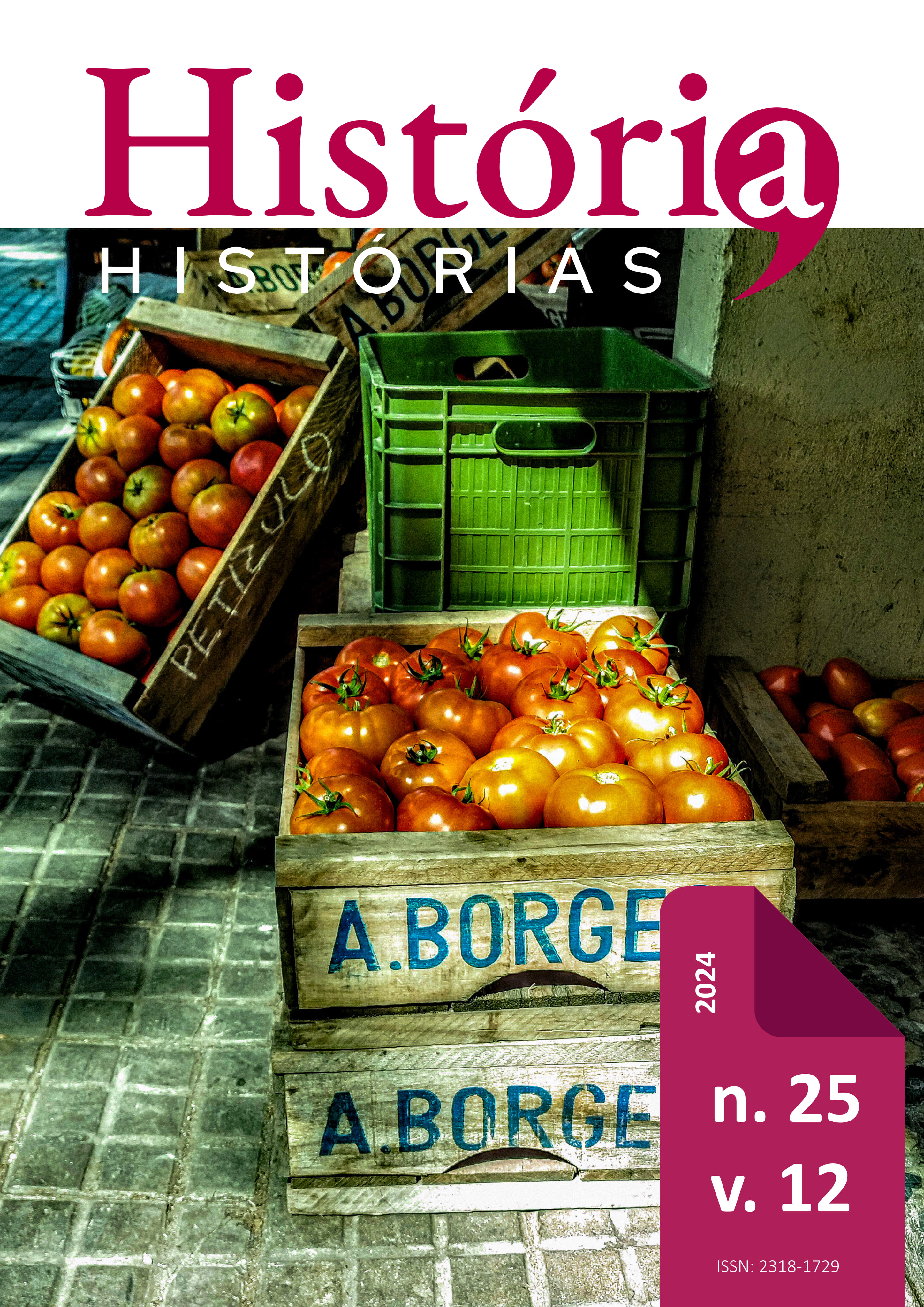Causas e implicações da Escravatura Doméstica no Reino do Ndongo
DOI:
https://doi.org/10.26512/rhh.v12i25.54608Palavras-chave:
Escravatura Doméstica, Reino do Ndongo, Escravos DomésticosResumo
A Escravatura Doméstica, prática costumeira em muitas regiões do mundo, ficou conhecida como Escravatura Patriarcal, em África, sendo que os Escravos Domésticos estavam integrados nas famílias em que prestavam as tarefas a si reservadas. No Reino do Ndongo, à semelhança de noutros reinos angolanos o fenómeno da Escravatura Doméstica foi uma realidade. O presente estudo se propôs a identificar as causas da Escravatura Doméstica e analisar as implicações desta prática no Ndongo. Serviu-nos de suporte a Pesquisa Bibliográfica a partir da qual pudemos constatar que a praticabilidade da Escravatura Doméstica no Ndongo esteve associada às guerras, porquanto os prisioneiros de guerra eram reduzidos à condição de escravos. A Escravatura Doméstica afectou o modus vivendi das populações do Ndongo, discriminando-as em homens livres e escravos. Os Escravos Domésticos foram alvos do Tráfico pan-Europeu de Escravos perdendo a sua dignidade e direitos, ao serem transformados em mercadoria permanente de um comércio pernicioso. Pelos seus múltiplos efeitos, a Escravatura Doméstica pode ter aberto precedentes para a conquista do Ndongo e seu posterior declínio.
Downloads
Referências
ALTUNA, Pe. Raul Ruiz De Asúa. Cultura Tradicional Banto, 2.ª edição, Secretariado Arquidiocesano de Pastoral, Luanda, 1993.
BIRMINGHAM, David. Aliânças e conflitos. Os primórdios da ocupação estrangeira em Angola 1483-1790, Luanda, AHA, 2004.
BRÁSIO, António Pe. Org. (1953). Monumenta Missionária Africana. Vol 2, África Ocidental (1532-1569). Lisboa: Agência Geral do Ultramar. Disponível em http://hdl.handle.net/10451/34721, consultado aos 6 de Março de 2024.
CADORNEGA, António de Oliveira. História Geral das Guerras Angolanas, Lisboa, Agencia Geral das colónias, Tomo I, 1680.
-Castelbranco, Francisco. História de Angola (1482-1910), o AUCTOR, s.d.
CENTRO DE ESTUDOS ANGOLANOS. História de Angola, Porto, Afrontamento, 1965.
COELHO,Virgílio. «Em busca de Kábàsà!...Estudos e Reflexões sobre o «Reino» do Ndòngò, 1.ª edição, Luanda, kilombelombe, 2010.
COELHO, Virgílio.Os de dentro, os de fora e os outros: análise sucinta de um modelo estrutural de organização administrativa e urbana do reino de Ndòngò, desde a sua fundação até fins do século XVI. Revista Fontes & Estudos, Nº 4-5, 1998/1999, p. 163-228.
COSTA, Bruno Silva e PEREIRA, Rita de Cássia Bianchi. Reino do Ndongo: Culturas e dinâmicas sociais múltiplas. Revista Ars Historica, n.º 16, Jan/Jun: 41-58, 2018. Disponível em: file:///C:/Users/24492/Downloads/Dialnet-ReinoDoNdongo-7595264.pdf, consultado aos 5 de Março de 2024.
HEINTZE, Beatrix. Angola nos séculos XVI e XVII. Luanda: Kilomelombe, 2007.
HEYWOOD, Linda M. & THORNTON, John K. Central Africans, Atlantic Creoles, and the foundation of the Americas, 1585-1660. Cambridge: Cambridge University Press, 2007.
IARRIC, Pierre de. Historie des choses plvs memorables adventes tant ez Indes Orientales, que autres païs de la descouuerte des Portugais, en l´establissement & progrez de la foy Chrestienne &Catholique:et principalemement de ce que les Religieux de la Compagnie de Iesvs y ont faict, & enduré pour la mesme fin depvis quíls y sont entrez iusqu´a l´na 1600 (Second partie), França, 1610.
KABWITA, Kabolo Iko. Le Royaume Kongo et la mission catholique 1750-1838, du déclin à l’extinction. Paris : Editions Karthala, 2004.
LARA, Silvia Hunold. Depois da Batalha de Pungo Andongo (1671): O destino atlântico dos Príncipes do Ndongo. rev. hist. (São Paulo), n. 175, p. 205-225, jul.dez., 2016, p. 207. Disponível em: http://dx.doi.org/10.11606/issn.2316-9141.rh.2016.121827, consultado aos 19 de Junho de 2024.
LEMOS, Alberto de. História de Angola (1482-1684), I volume, Lisboa, Oficina Gráfica, 1932.
MAGYAR, Ladislau Amerigo: Carta ao Governador de Benguella, sobre o interior da Africa Austral. Gambos, 21 de Março de 1853. Annaes do Conselho Ultramarino, (1856). N.º 2. Parte não oficial, série I. Fevereiro de 1854 a Dezembro 1858. Lisboa: Imprensa Nacional, 1856. p. 237-240.
MEDINA, João e HENRIQUES, Isabel Castro. A rota dos escravos: Angola e a rede do comércio negreiro, Lisboa, Cegia, 1996.
MILLER, Joseph. A África Central durante a era do comércio de escravizados, de 1490 a 1850. In. HEYWOOD, Linda M. (org.) Diáspora negra no Brasil. São Paulo: Contexto, 2013.
MILLER, Joseph. Poder político e parentesco, os antigos Estados Mbundu em Angola, Luanda, AHA, 1995.
MONTECÚCCOLO, João António Cavazzi de. Descrição Histórica dos três Reinos do Congo, Matamba, e Angola, I volume, Lisboa, Junta de Investigação do Ultramar, 1965.
OLIVEIRA, Vanessa S. “Uma mulher nunca tinha governado esse Reino”: Rainha Njinga, Biografia e Memória. Heywood, Linda M. Njinga of Angola: Africa´s Warrior Queen. Cambridge: Harvard University Press, 2017. 310p. Afro-Ásia [on line]. 2017, (55), 295-302. ISSN: 0002-0591. Disponível em https://www.redalyc.org/artigo.ao?id=7705300280012, Consultado aos 1 de Junho de 2023.
SEBESTYÉN, Éva. A sociedade ovimbundu nos relatórios de viagens do húngaro László Magyar: sul de Angola, meados do século XIX, Revista História: Debates e Tendências, vol. 15, núm. 1, jan./jun., 2015, pp. 83-100. Disponível em: https://www.redalyc.org/pdf/5524/552456385006.pdf, consultado aos 21 de Maio de 2024.
WHEELER, Douglas e Pélissier, René. História de Angola, Tinta-da-China, Lisboa, 2009.
Downloads
Publicado
Como Citar
Edição
Seção
Licença
Copyright (c) 2024 História, histórias

Este trabalho está licenciado sob uma licença Creative Commons Attribution-NonCommercial-NoDerivatives 4.0 International License.
Autores que publicam nesta revista concordam com os seguintes termos:
- Autores mantêm os direitos autorais e concedem à revista o direito de primeira publicação, com o trabalho simultaneamente licenciado sob a Licença Creative Commons Attribution que permite o compartilhamento do trabalho com reconhecimento da autoria e publicação inicial nesta revista.
- Autores têm autorização para assumir contratos adicionais separadamente, para distribuição não-exclusiva da versão do trabalho publicada nesta revista (ex.: publicar em repositório institucional ou como capítulo de livro), com reconhecimento de autoria e publicação inicial nesta revista.
- Autores têm permissão e são estimulados a publicar e distribuir seu trabalho online (ex.: em repositórios institucionais ou na sua página pessoal) a qualquer ponto antes ou durante o processo editorial, já que isso pode gerar alterações produtivas, bem como aumentar o impacto e a citação do trabalho publicado.




